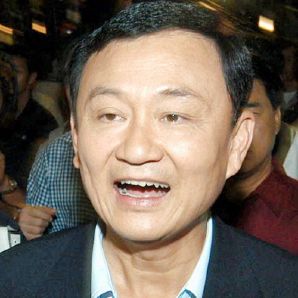Former Thai premier fails to return from Olympics to face trial
 Bangkok - Deposed prime minister Thaksin Shinawatra and his wife Pojaman failed to appear at the Supreme Court Monday, as ordered, amid speculation that the former first couple were seeking asylum abroad.
Bangkok - Deposed prime minister Thaksin Shinawatra and his wife Pojaman failed to appear at the Supreme Court Monday, as ordered, amid speculation that the former first couple were seeking asylum abroad.
The court on July 29 granted Thaksin and Pojaman, who face several abuse-of-power and corruption cases in Thailand, permission to travel to Beijing to attend the opening ceremony of the Olympic Games in Beijing on Friday.
The couple were scheduled to return from Beijing Sunday night on Thai Airways International (THAI) flight 615 in time to appear at the Supreme Court for political office holders Monday.
The court appearance was demanded to prove Thaksin and his wife had returned to stand trial on Friday in the Ratchadaphist land case in which the couple stand accused of abusing power in a land purchase deal in 2003 when Thaksin was still prime minister.
Thaksin faces at least four corruption and abuse of power cases from his controversial premiership while his wife on July 31 was sentenced to three years in prison on a tax evasion charge. She had appealed the sentence.
Thaksin was prime minister from 2001 to September 19, 2006, when he was toppled by a military coup on charges of corruption, dividing the nation and undermining democracy and the monarchy.
The couple did not board the THAI flight and have reportedly flown to London where Thaksin will issue a press statement, according to Pracha Prasopdee, a member of the ruling People Power Party (PPP) that has always supported Thaksin and allegedly enjoys Thaksin's financial support.
"Thaksin will issue a statement from London at 9 am Monday stating why he did not go to Bangkok as scheduled," Pracha told the Thai News Agency (TNA).
The Shinawatra's three children, son Panthongtae and daughters Pinthongta and Paethongtan, departed Bangkok for London on Saturday.
If Thaksin has indeed sought political asylum in England, it will mark the end of his political career in Thailand, observers said.
"His political career is effectively finished in the event that he seeks asylum or goes in to exile because if the court cases go against him he will be a fugitive," said Thitinan Pongsudhirak, director of the Institute of Security and International Studies (ISIS) at Chulalongkorn University.
Thaksin was in self-exile, mostly in London, for more than a year after the September 19, 2006 coup and only returned to Thailand in February to face several corruption charges.
Although he is closely allied to the People Power Party, that leads the current government, his political clout has not protected him from the Thai judiciary which is pressing several cases against the former first couple and has already sentenced his wife to jail.
A former policeman who became a billionaire telecommunications' tycoon, Thaksin came to power on a populist platform in 2001. He was ousted by a military coup in September 2006 on charges of corruption, dividing the nation and undermining democracy and the monarchy.
Thaksin remains one of Thailand's most popular, and controversial, political figures.
While populist policies won Thaksin the devotion among Thailand's masses of rural and urban poor, evidence of corruption and self-serving policies during his increasingly monopolistic rule turned the Bangkok-based middle class and political elite against him in early 2006, ushering in his downfall at the hands of the army. (dpa)